NRS10733 Essay: Analyzing Leah Purcell's Health Narrative and SDOH
VerifiedAdded on 2022/09/27
|11
|3221
|20
Essay
AI Summary
This essay delves into the health narrative of Leah Purcell, an Indigenous Australian actress, director, and writer, examining how social determinants of health (SDOH) shaped her experiences. The essay begins by defining health narratives and their significance in understanding an individual's health journey, followed by an explanation of SDOH and their impact. The case study then summarizes Leah Purcell's life, highlighting the influence of racism, poverty, and alcoholism on her childhood and adult life. The analysis draws on academic research to illustrate how these factors affected her health experience. The essay emphasizes the interconnectedness of health narratives and SDOH, concluding that healthcare professionals must consider these factors when supporting patients' well-being. The provided references support the arguments made throughout the essay.
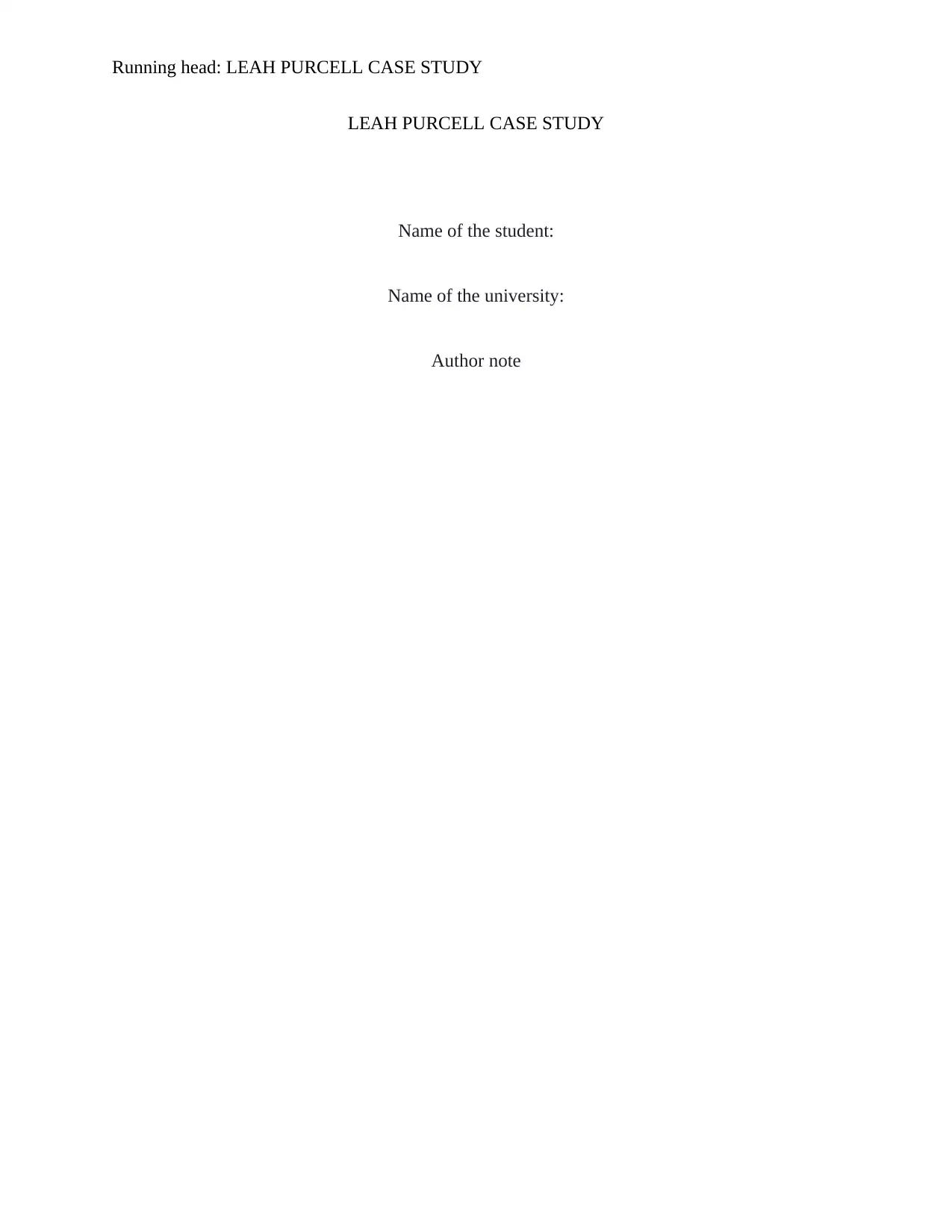
Running head: LEAH PURCELL CASE STUDY
LEAH PURCELL CASE STUDY
Name of the student:
Name of the university:
Author note
LEAH PURCELL CASE STUDY
Name of the student:
Name of the university:
Author note
Paraphrase This Document
Need a fresh take? Get an instant paraphrase of this document with our AI Paraphraser
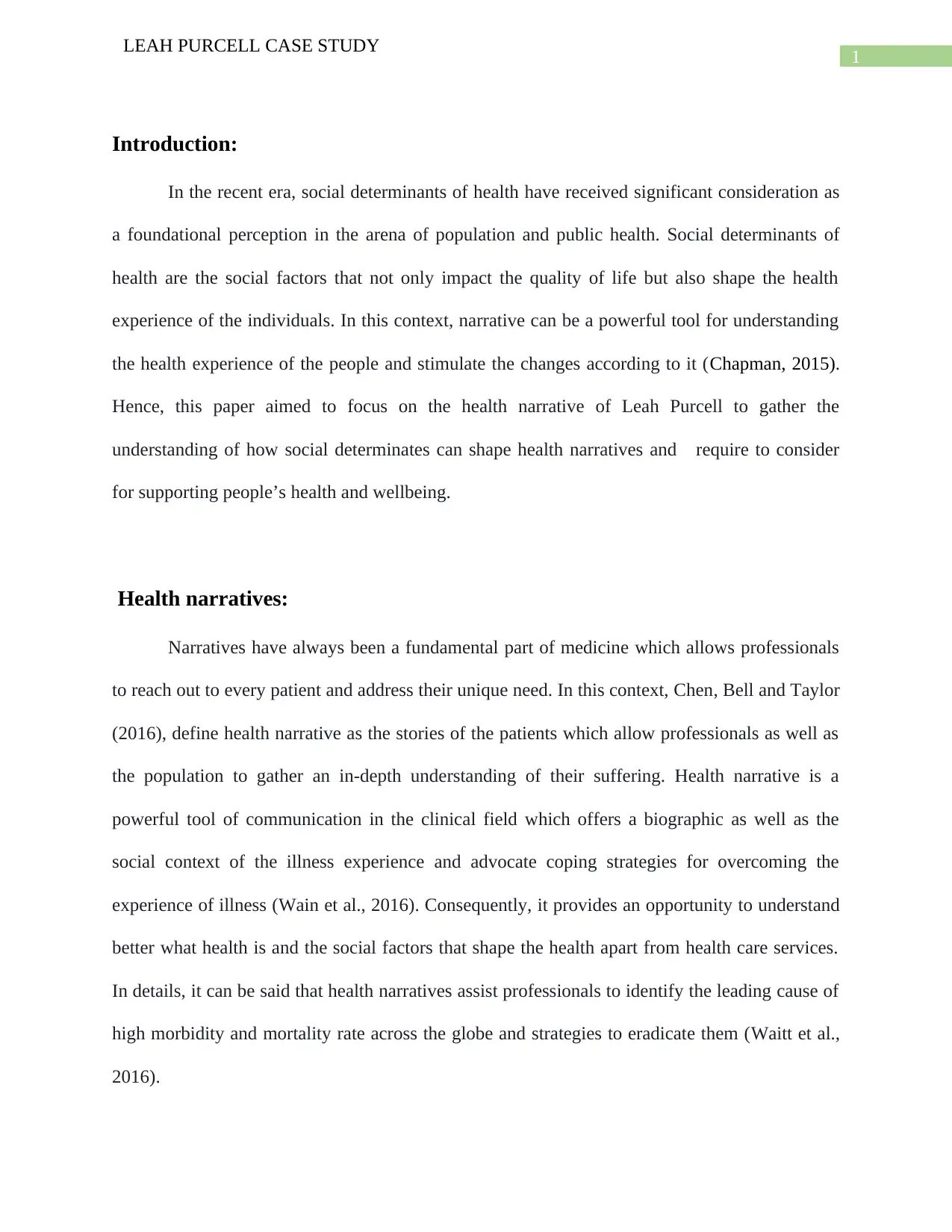
1
LEAH PURCELL CASE STUDY
Introduction:
In the recent era, social determinants of health have received significant consideration as
a foundational perception in the arena of population and public health. Social determinants of
health are the social factors that not only impact the quality of life but also shape the health
experience of the individuals. In this context, narrative can be a powerful tool for understanding
the health experience of the people and stimulate the changes according to it (Chapman, 2015).
Hence, this paper aimed to focus on the health narrative of Leah Purcell to gather the
understanding of how social determinates can shape health narratives and require to consider
for supporting people’s health and wellbeing.
Health narratives:
Narratives have always been a fundamental part of medicine which allows professionals
to reach out to every patient and address their unique need. In this context, Chen, Bell and Taylor
(2016), define health narrative as the stories of the patients which allow professionals as well as
the population to gather an in-depth understanding of their suffering. Health narrative is a
powerful tool of communication in the clinical field which offers a biographic as well as the
social context of the illness experience and advocate coping strategies for overcoming the
experience of illness (Wain et al., 2016). Consequently, it provides an opportunity to understand
better what health is and the social factors that shape the health apart from health care services.
In details, it can be said that health narratives assist professionals to identify the leading cause of
high morbidity and mortality rate across the globe and strategies to eradicate them (Waitt et al.,
2016).
LEAH PURCELL CASE STUDY
Introduction:
In the recent era, social determinants of health have received significant consideration as
a foundational perception in the arena of population and public health. Social determinants of
health are the social factors that not only impact the quality of life but also shape the health
experience of the individuals. In this context, narrative can be a powerful tool for understanding
the health experience of the people and stimulate the changes according to it (Chapman, 2015).
Hence, this paper aimed to focus on the health narrative of Leah Purcell to gather the
understanding of how social determinates can shape health narratives and require to consider
for supporting people’s health and wellbeing.
Health narratives:
Narratives have always been a fundamental part of medicine which allows professionals
to reach out to every patient and address their unique need. In this context, Chen, Bell and Taylor
(2016), define health narrative as the stories of the patients which allow professionals as well as
the population to gather an in-depth understanding of their suffering. Health narrative is a
powerful tool of communication in the clinical field which offers a biographic as well as the
social context of the illness experience and advocate coping strategies for overcoming the
experience of illness (Wain et al., 2016). Consequently, it provides an opportunity to understand
better what health is and the social factors that shape the health apart from health care services.
In details, it can be said that health narratives assist professionals to identify the leading cause of
high morbidity and mortality rate across the globe and strategies to eradicate them (Waitt et al.,
2016).
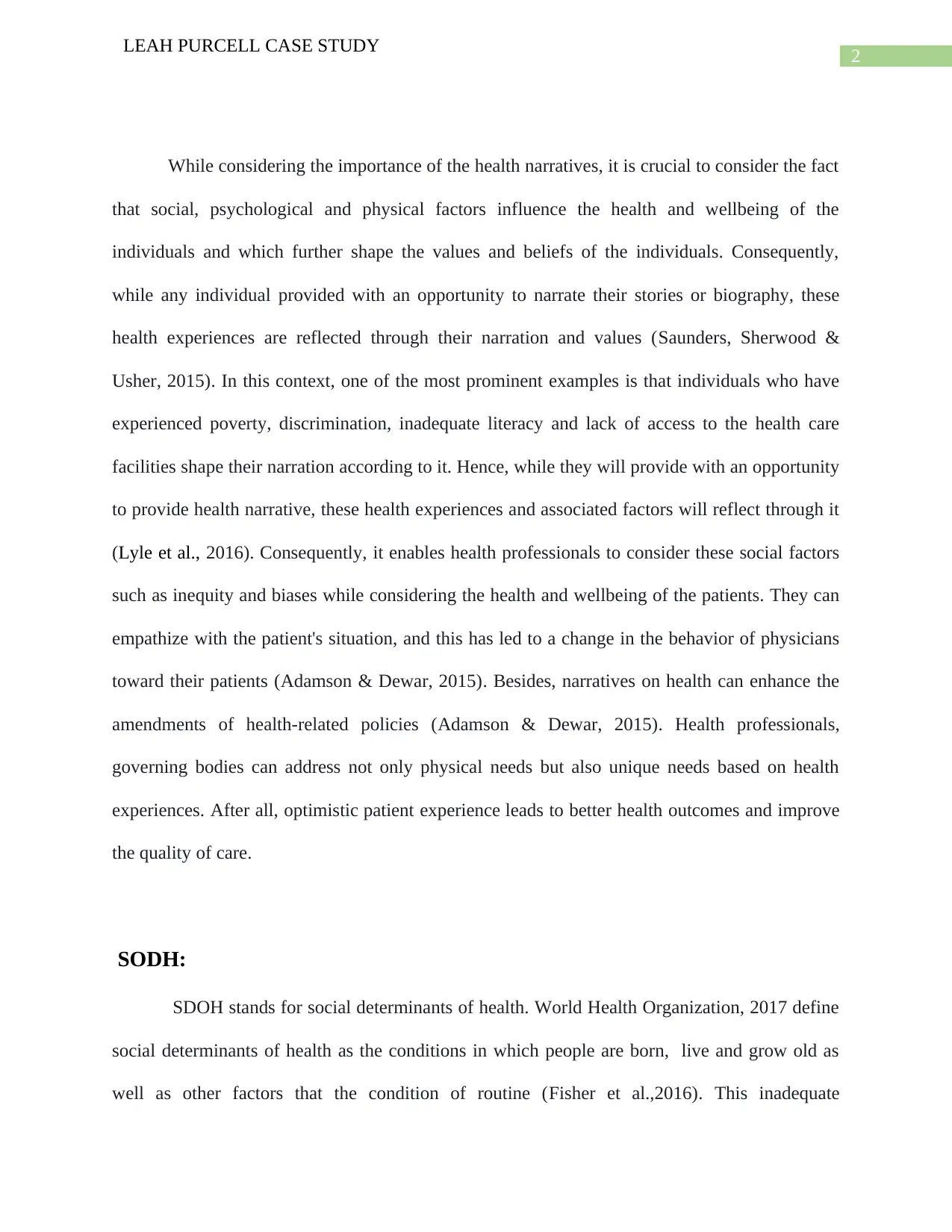
2
LEAH PURCELL CASE STUDY
While considering the importance of the health narratives, it is crucial to consider the fact
that social, psychological and physical factors influence the health and wellbeing of the
individuals and which further shape the values and beliefs of the individuals. Consequently,
while any individual provided with an opportunity to narrate their stories or biography, these
health experiences are reflected through their narration and values (Saunders, Sherwood &
Usher, 2015). In this context, one of the most prominent examples is that individuals who have
experienced poverty, discrimination, inadequate literacy and lack of access to the health care
facilities shape their narration according to it. Hence, while they will provide with an opportunity
to provide health narrative, these health experiences and associated factors will reflect through it
(Lyle et al., 2016). Consequently, it enables health professionals to consider these social factors
such as inequity and biases while considering the health and wellbeing of the patients. They can
empathize with the patient's situation, and this has led to a change in the behavior of physicians
toward their patients (Adamson & Dewar, 2015). Besides, narratives on health can enhance the
amendments of health-related policies (Adamson & Dewar, 2015). Health professionals,
governing bodies can address not only physical needs but also unique needs based on health
experiences. After all, optimistic patient experience leads to better health outcomes and improve
the quality of care.
SODH:
SDOH stands for social determinants of health. World Health Organization, 2017 define
social determinants of health as the conditions in which people are born, live and grow old as
well as other factors that the condition of routine (Fisher et al.,2016). This inadequate
LEAH PURCELL CASE STUDY
While considering the importance of the health narratives, it is crucial to consider the fact
that social, psychological and physical factors influence the health and wellbeing of the
individuals and which further shape the values and beliefs of the individuals. Consequently,
while any individual provided with an opportunity to narrate their stories or biography, these
health experiences are reflected through their narration and values (Saunders, Sherwood &
Usher, 2015). In this context, one of the most prominent examples is that individuals who have
experienced poverty, discrimination, inadequate literacy and lack of access to the health care
facilities shape their narration according to it. Hence, while they will provide with an opportunity
to provide health narrative, these health experiences and associated factors will reflect through it
(Lyle et al., 2016). Consequently, it enables health professionals to consider these social factors
such as inequity and biases while considering the health and wellbeing of the patients. They can
empathize with the patient's situation, and this has led to a change in the behavior of physicians
toward their patients (Adamson & Dewar, 2015). Besides, narratives on health can enhance the
amendments of health-related policies (Adamson & Dewar, 2015). Health professionals,
governing bodies can address not only physical needs but also unique needs based on health
experiences. After all, optimistic patient experience leads to better health outcomes and improve
the quality of care.
SODH:
SDOH stands for social determinants of health. World Health Organization, 2017 define
social determinants of health as the conditions in which people are born, live and grow old as
well as other factors that the condition of routine (Fisher et al.,2016). This inadequate
⊘ This is a preview!⊘
Do you want full access?
Subscribe today to unlock all pages.

Trusted by 1+ million students worldwide
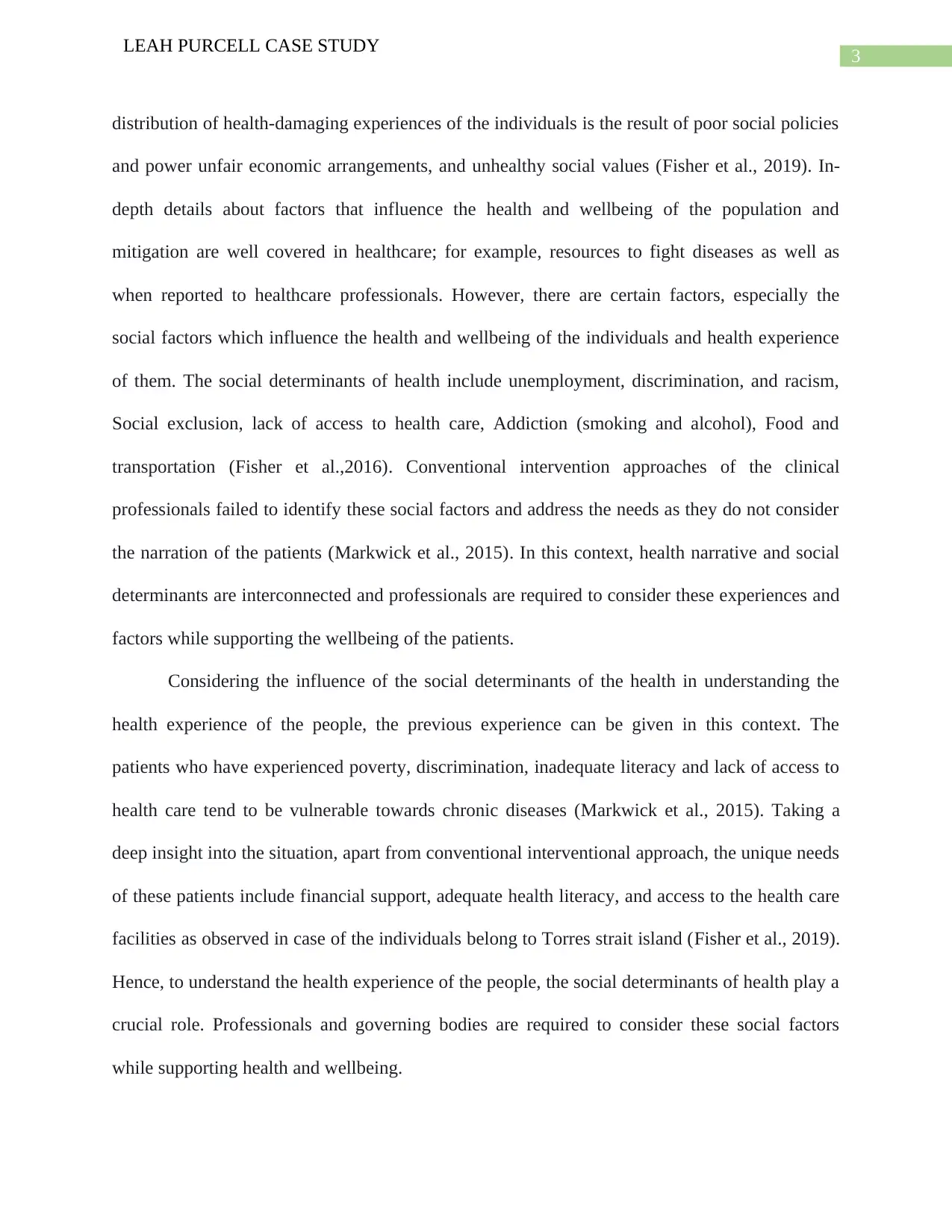
3
LEAH PURCELL CASE STUDY
distribution of health-damaging experiences of the individuals is the result of poor social policies
and power unfair economic arrangements, and unhealthy social values (Fisher et al., 2019). In-
depth details about factors that influence the health and wellbeing of the population and
mitigation are well covered in healthcare; for example, resources to fight diseases as well as
when reported to healthcare professionals. However, there are certain factors, especially the
social factors which influence the health and wellbeing of the individuals and health experience
of them. The social determinants of health include unemployment, discrimination, and racism,
Social exclusion, lack of access to health care, Addiction (smoking and alcohol), Food and
transportation (Fisher et al.,2016). Conventional intervention approaches of the clinical
professionals failed to identify these social factors and address the needs as they do not consider
the narration of the patients (Markwick et al., 2015). In this context, health narrative and social
determinants are interconnected and professionals are required to consider these experiences and
factors while supporting the wellbeing of the patients.
Considering the influence of the social determinants of the health in understanding the
health experience of the people, the previous experience can be given in this context. The
patients who have experienced poverty, discrimination, inadequate literacy and lack of access to
health care tend to be vulnerable towards chronic diseases (Markwick et al., 2015). Taking a
deep insight into the situation, apart from conventional interventional approach, the unique needs
of these patients include financial support, adequate health literacy, and access to the health care
facilities as observed in case of the individuals belong to Torres strait island (Fisher et al., 2019).
Hence, to understand the health experience of the people, the social determinants of health play a
crucial role. Professionals and governing bodies are required to consider these social factors
while supporting health and wellbeing.
LEAH PURCELL CASE STUDY
distribution of health-damaging experiences of the individuals is the result of poor social policies
and power unfair economic arrangements, and unhealthy social values (Fisher et al., 2019). In-
depth details about factors that influence the health and wellbeing of the population and
mitigation are well covered in healthcare; for example, resources to fight diseases as well as
when reported to healthcare professionals. However, there are certain factors, especially the
social factors which influence the health and wellbeing of the individuals and health experience
of them. The social determinants of health include unemployment, discrimination, and racism,
Social exclusion, lack of access to health care, Addiction (smoking and alcohol), Food and
transportation (Fisher et al.,2016). Conventional intervention approaches of the clinical
professionals failed to identify these social factors and address the needs as they do not consider
the narration of the patients (Markwick et al., 2015). In this context, health narrative and social
determinants are interconnected and professionals are required to consider these experiences and
factors while supporting the wellbeing of the patients.
Considering the influence of the social determinants of the health in understanding the
health experience of the people, the previous experience can be given in this context. The
patients who have experienced poverty, discrimination, inadequate literacy and lack of access to
health care tend to be vulnerable towards chronic diseases (Markwick et al., 2015). Taking a
deep insight into the situation, apart from conventional interventional approach, the unique needs
of these patients include financial support, adequate health literacy, and access to the health care
facilities as observed in case of the individuals belong to Torres strait island (Fisher et al., 2019).
Hence, to understand the health experience of the people, the social determinants of health play a
crucial role. Professionals and governing bodies are required to consider these social factors
while supporting health and wellbeing.
Paraphrase This Document
Need a fresh take? Get an instant paraphrase of this document with our AI Paraphraser
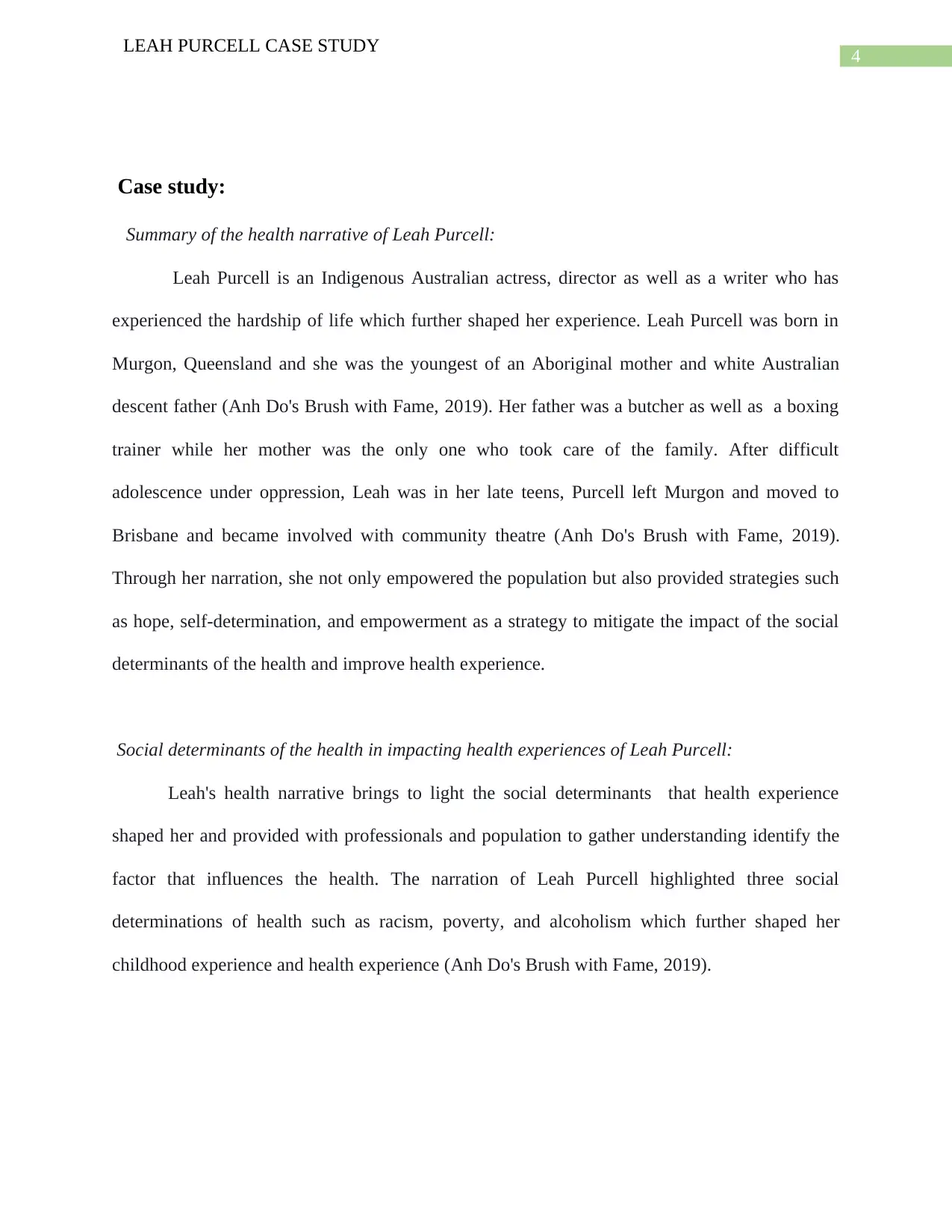
4
LEAH PURCELL CASE STUDY
Case study:
Summary of the health narrative of Leah Purcell:
Leah Purcell is an Indigenous Australian actress, director as well as a writer who has
experienced the hardship of life which further shaped her experience. Leah Purcell was born in
Murgon, Queensland and she was the youngest of an Aboriginal mother and white Australian
descent father (Anh Do's Brush with Fame, 2019). Her father was a butcher as well as a boxing
trainer while her mother was the only one who took care of the family. After difficult
adolescence under oppression, Leah was in her late teens, Purcell left Murgon and moved to
Brisbane and became involved with community theatre (Anh Do's Brush with Fame, 2019).
Through her narration, she not only empowered the population but also provided strategies such
as hope, self-determination, and empowerment as a strategy to mitigate the impact of the social
determinants of the health and improve health experience.
Social determinants of the health in impacting health experiences of Leah Purcell:
Leah's health narrative brings to light the social determinants that health experience
shaped her and provided with professionals and population to gather understanding identify the
factor that influences the health. The narration of Leah Purcell highlighted three social
determinations of health such as racism, poverty, and alcoholism which further shaped her
childhood experience and health experience (Anh Do's Brush with Fame, 2019).
LEAH PURCELL CASE STUDY
Case study:
Summary of the health narrative of Leah Purcell:
Leah Purcell is an Indigenous Australian actress, director as well as a writer who has
experienced the hardship of life which further shaped her experience. Leah Purcell was born in
Murgon, Queensland and she was the youngest of an Aboriginal mother and white Australian
descent father (Anh Do's Brush with Fame, 2019). Her father was a butcher as well as a boxing
trainer while her mother was the only one who took care of the family. After difficult
adolescence under oppression, Leah was in her late teens, Purcell left Murgon and moved to
Brisbane and became involved with community theatre (Anh Do's Brush with Fame, 2019).
Through her narration, she not only empowered the population but also provided strategies such
as hope, self-determination, and empowerment as a strategy to mitigate the impact of the social
determinants of the health and improve health experience.
Social determinants of the health in impacting health experiences of Leah Purcell:
Leah's health narrative brings to light the social determinants that health experience
shaped her and provided with professionals and population to gather understanding identify the
factor that influences the health. The narration of Leah Purcell highlighted three social
determinations of health such as racism, poverty, and alcoholism which further shaped her
childhood experience and health experience (Anh Do's Brush with Fame, 2019).
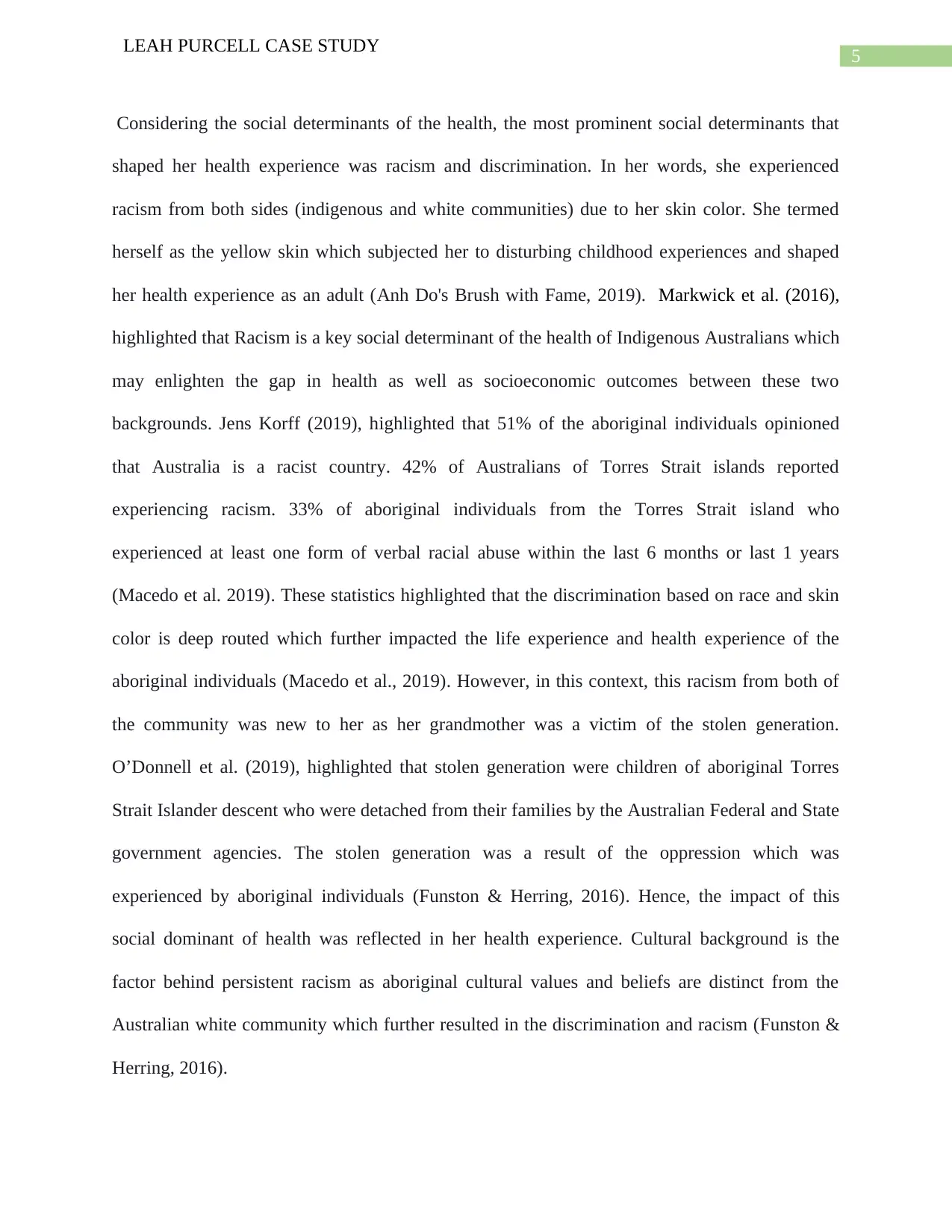
5
LEAH PURCELL CASE STUDY
Considering the social determinants of the health, the most prominent social determinants that
shaped her health experience was racism and discrimination. In her words, she experienced
racism from both sides (indigenous and white communities) due to her skin color. She termed
herself as the yellow skin which subjected her to disturbing childhood experiences and shaped
her health experience as an adult (Anh Do's Brush with Fame, 2019). Markwick et al. (2016),
highlighted that Racism is a key social determinant of the health of Indigenous Australians which
may enlighten the gap in health as well as socioeconomic outcomes between these two
backgrounds. Jens Korff (2019), highlighted that 51% of the aboriginal individuals opinioned
that Australia is a racist country. 42% of Australians of Torres Strait islands reported
experiencing racism. 33% of aboriginal individuals from the Torres Strait island who
experienced at least one form of verbal racial abuse within the last 6 months or last 1 years
(Macedo et al. 2019). These statistics highlighted that the discrimination based on race and skin
color is deep routed which further impacted the life experience and health experience of the
aboriginal individuals (Macedo et al., 2019). However, in this context, this racism from both of
the community was new to her as her grandmother was a victim of the stolen generation.
O’Donnell et al. (2019), highlighted that stolen generation were children of aboriginal Torres
Strait Islander descent who were detached from their families by the Australian Federal and State
government agencies. The stolen generation was a result of the oppression which was
experienced by aboriginal individuals (Funston & Herring, 2016). Hence, the impact of this
social dominant of health was reflected in her health experience. Cultural background is the
factor behind persistent racism as aboriginal cultural values and beliefs are distinct from the
Australian white community which further resulted in the discrimination and racism (Funston &
Herring, 2016).
LEAH PURCELL CASE STUDY
Considering the social determinants of the health, the most prominent social determinants that
shaped her health experience was racism and discrimination. In her words, she experienced
racism from both sides (indigenous and white communities) due to her skin color. She termed
herself as the yellow skin which subjected her to disturbing childhood experiences and shaped
her health experience as an adult (Anh Do's Brush with Fame, 2019). Markwick et al. (2016),
highlighted that Racism is a key social determinant of the health of Indigenous Australians which
may enlighten the gap in health as well as socioeconomic outcomes between these two
backgrounds. Jens Korff (2019), highlighted that 51% of the aboriginal individuals opinioned
that Australia is a racist country. 42% of Australians of Torres Strait islands reported
experiencing racism. 33% of aboriginal individuals from the Torres Strait island who
experienced at least one form of verbal racial abuse within the last 6 months or last 1 years
(Macedo et al. 2019). These statistics highlighted that the discrimination based on race and skin
color is deep routed which further impacted the life experience and health experience of the
aboriginal individuals (Macedo et al., 2019). However, in this context, this racism from both of
the community was new to her as her grandmother was a victim of the stolen generation.
O’Donnell et al. (2019), highlighted that stolen generation were children of aboriginal Torres
Strait Islander descent who were detached from their families by the Australian Federal and State
government agencies. The stolen generation was a result of the oppression which was
experienced by aboriginal individuals (Funston & Herring, 2016). Hence, the impact of this
social dominant of health was reflected in her health experience. Cultural background is the
factor behind persistent racism as aboriginal cultural values and beliefs are distinct from the
Australian white community which further resulted in the discrimination and racism (Funston &
Herring, 2016).
⊘ This is a preview!⊘
Do you want full access?
Subscribe today to unlock all pages.

Trusted by 1+ million students worldwide
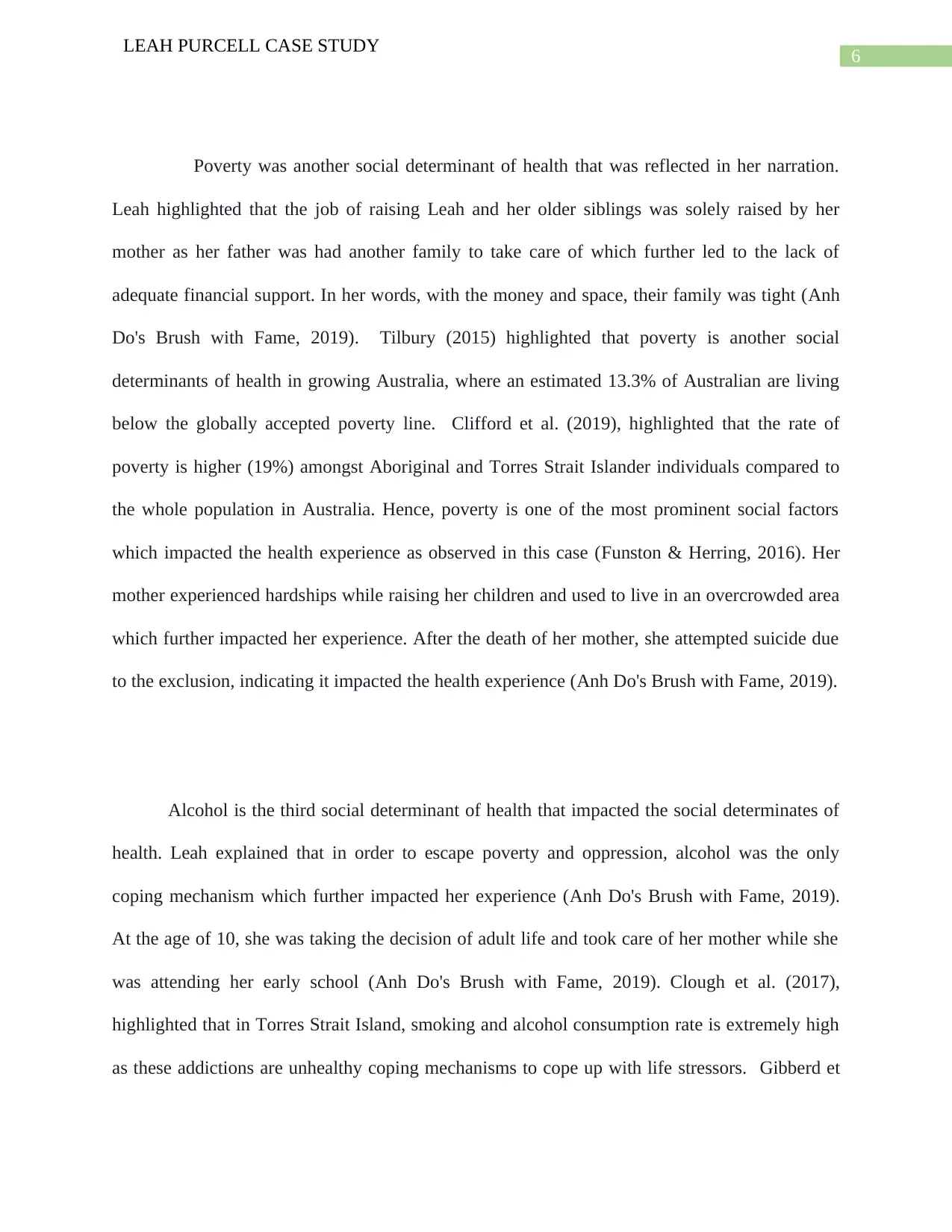
6
LEAH PURCELL CASE STUDY
Poverty was another social determinant of health that was reflected in her narration.
Leah highlighted that the job of raising Leah and her older siblings was solely raised by her
mother as her father was had another family to take care of which further led to the lack of
adequate financial support. In her words, with the money and space, their family was tight (Anh
Do's Brush with Fame, 2019). Tilbury (2015) highlighted that poverty is another social
determinants of health in growing Australia, where an estimated 13.3% of Australian are living
below the globally accepted poverty line. Clifford et al. (2019), highlighted that the rate of
poverty is higher (19%) amongst Aboriginal and Torres Strait Islander individuals compared to
the whole population in Australia. Hence, poverty is one of the most prominent social factors
which impacted the health experience as observed in this case (Funston & Herring, 2016). Her
mother experienced hardships while raising her children and used to live in an overcrowded area
which further impacted her experience. After the death of her mother, she attempted suicide due
to the exclusion, indicating it impacted the health experience (Anh Do's Brush with Fame, 2019).
Alcohol is the third social determinant of health that impacted the social determinates of
health. Leah explained that in order to escape poverty and oppression, alcohol was the only
coping mechanism which further impacted her experience (Anh Do's Brush with Fame, 2019).
At the age of 10, she was taking the decision of adult life and took care of her mother while she
was attending her early school (Anh Do's Brush with Fame, 2019). Clough et al. (2017),
highlighted that in Torres Strait Island, smoking and alcohol consumption rate is extremely high
as these addictions are unhealthy coping mechanisms to cope up with life stressors. Gibberd et
LEAH PURCELL CASE STUDY
Poverty was another social determinant of health that was reflected in her narration.
Leah highlighted that the job of raising Leah and her older siblings was solely raised by her
mother as her father was had another family to take care of which further led to the lack of
adequate financial support. In her words, with the money and space, their family was tight (Anh
Do's Brush with Fame, 2019). Tilbury (2015) highlighted that poverty is another social
determinants of health in growing Australia, where an estimated 13.3% of Australian are living
below the globally accepted poverty line. Clifford et al. (2019), highlighted that the rate of
poverty is higher (19%) amongst Aboriginal and Torres Strait Islander individuals compared to
the whole population in Australia. Hence, poverty is one of the most prominent social factors
which impacted the health experience as observed in this case (Funston & Herring, 2016). Her
mother experienced hardships while raising her children and used to live in an overcrowded area
which further impacted her experience. After the death of her mother, she attempted suicide due
to the exclusion, indicating it impacted the health experience (Anh Do's Brush with Fame, 2019).
Alcohol is the third social determinant of health that impacted the social determinates of
health. Leah explained that in order to escape poverty and oppression, alcohol was the only
coping mechanism which further impacted her experience (Anh Do's Brush with Fame, 2019).
At the age of 10, she was taking the decision of adult life and took care of her mother while she
was attending her early school (Anh Do's Brush with Fame, 2019). Clough et al. (2017),
highlighted that in Torres Strait Island, smoking and alcohol consumption rate is extremely high
as these addictions are unhealthy coping mechanisms to cope up with life stressors. Gibberd et
Paraphrase This Document
Need a fresh take? Get an instant paraphrase of this document with our AI Paraphraser
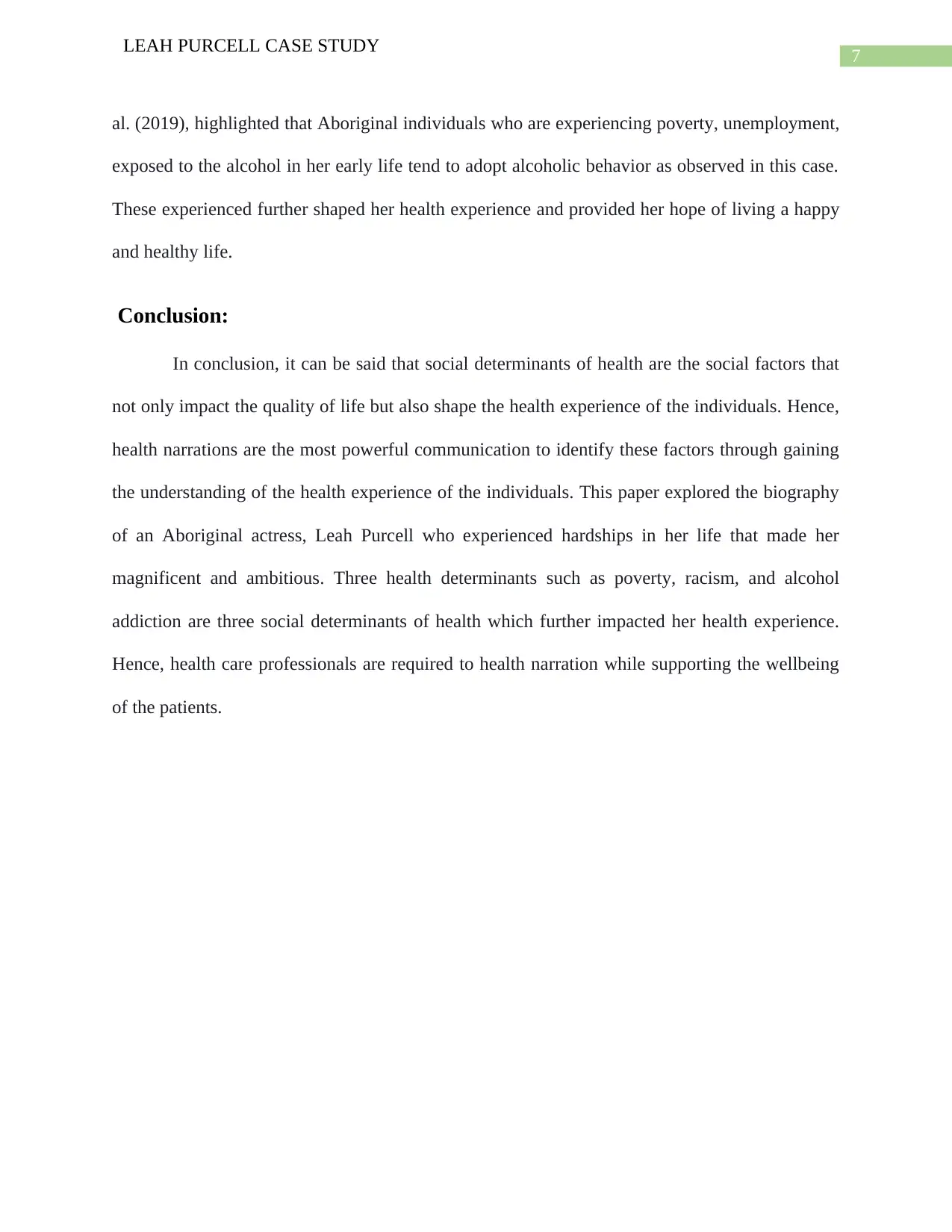
7
LEAH PURCELL CASE STUDY
al. (2019), highlighted that Aboriginal individuals who are experiencing poverty, unemployment,
exposed to the alcohol in her early life tend to adopt alcoholic behavior as observed in this case.
These experienced further shaped her health experience and provided her hope of living a happy
and healthy life.
Conclusion:
In conclusion, it can be said that social determinants of health are the social factors that
not only impact the quality of life but also shape the health experience of the individuals. Hence,
health narrations are the most powerful communication to identify these factors through gaining
the understanding of the health experience of the individuals. This paper explored the biography
of an Aboriginal actress, Leah Purcell who experienced hardships in her life that made her
magnificent and ambitious. Three health determinants such as poverty, racism, and alcohol
addiction are three social determinants of health which further impacted her health experience.
Hence, health care professionals are required to health narration while supporting the wellbeing
of the patients.
LEAH PURCELL CASE STUDY
al. (2019), highlighted that Aboriginal individuals who are experiencing poverty, unemployment,
exposed to the alcohol in her early life tend to adopt alcoholic behavior as observed in this case.
These experienced further shaped her health experience and provided her hope of living a happy
and healthy life.
Conclusion:
In conclusion, it can be said that social determinants of health are the social factors that
not only impact the quality of life but also shape the health experience of the individuals. Hence,
health narrations are the most powerful communication to identify these factors through gaining
the understanding of the health experience of the individuals. This paper explored the biography
of an Aboriginal actress, Leah Purcell who experienced hardships in her life that made her
magnificent and ambitious. Three health determinants such as poverty, racism, and alcohol
addiction are three social determinants of health which further impacted her health experience.
Hence, health care professionals are required to health narration while supporting the wellbeing
of the patients.
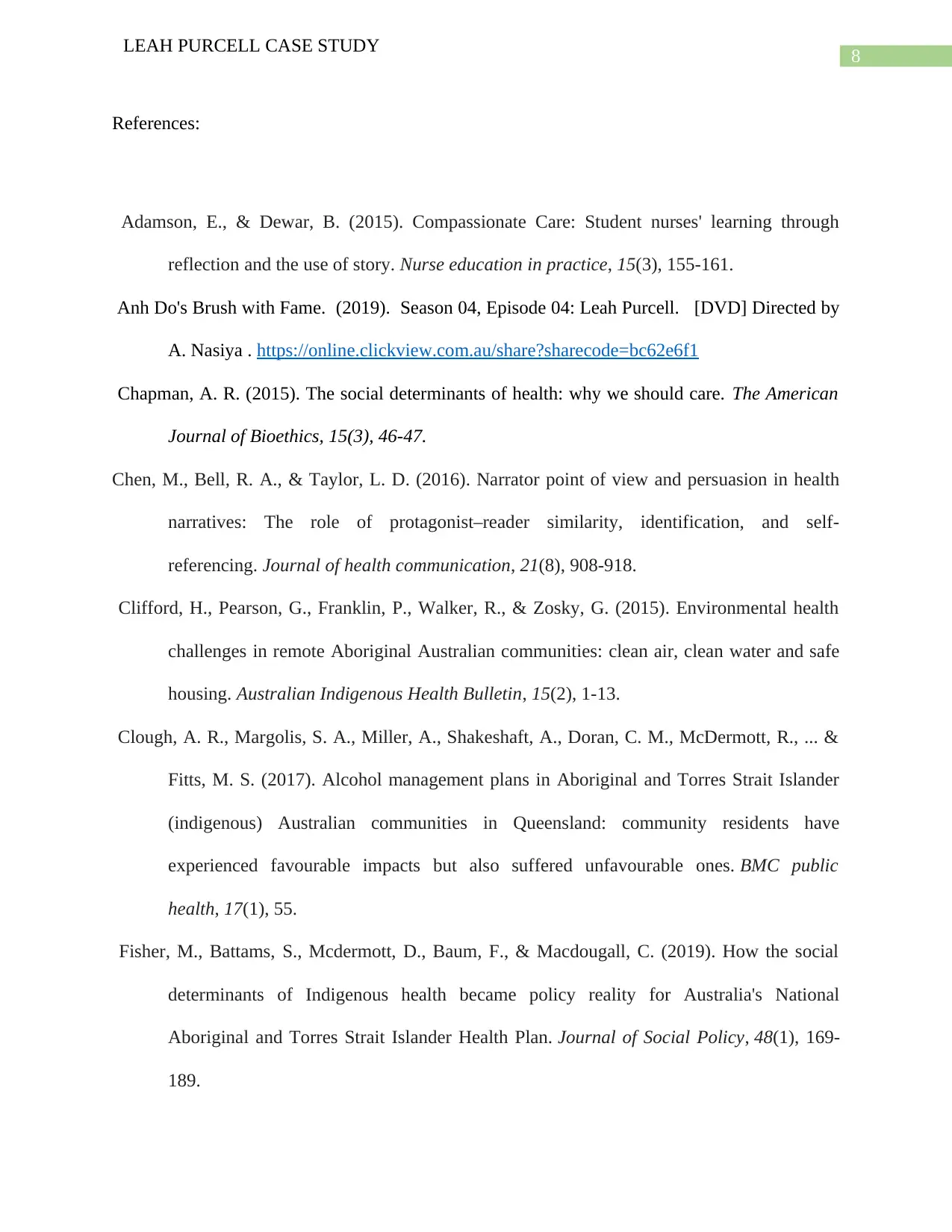
8
LEAH PURCELL CASE STUDY
References:
Adamson, E., & Dewar, B. (2015). Compassionate Care: Student nurses' learning through
reflection and the use of story. Nurse education in practice, 15(3), 155-161.
Anh Do's Brush with Fame. (2019). Season 04, Episode 04: Leah Purcell. [DVD] Directed by
A. Nasiya . https://online.clickview.com.au/share?sharecode=bc62e6f1
Chapman, A. R. (2015). The social determinants of health: why we should care. The American
Journal of Bioethics, 15(3), 46-47.
Chen, M., Bell, R. A., & Taylor, L. D. (2016). Narrator point of view and persuasion in health
narratives: The role of protagonist–reader similarity, identification, and self-
referencing. Journal of health communication, 21(8), 908-918.
Clifford, H., Pearson, G., Franklin, P., Walker, R., & Zosky, G. (2015). Environmental health
challenges in remote Aboriginal Australian communities: clean air, clean water and safe
housing. Australian Indigenous Health Bulletin, 15(2), 1-13.
Clough, A. R., Margolis, S. A., Miller, A., Shakeshaft, A., Doran, C. M., McDermott, R., ... &
Fitts, M. S. (2017). Alcohol management plans in Aboriginal and Torres Strait Islander
(indigenous) Australian communities in Queensland: community residents have
experienced favourable impacts but also suffered unfavourable ones. BMC public
health, 17(1), 55.
Fisher, M., Battams, S., Mcdermott, D., Baum, F., & Macdougall, C. (2019). How the social
determinants of Indigenous health became policy reality for Australia's National
Aboriginal and Torres Strait Islander Health Plan. Journal of Social Policy, 48(1), 169-
189.
LEAH PURCELL CASE STUDY
References:
Adamson, E., & Dewar, B. (2015). Compassionate Care: Student nurses' learning through
reflection and the use of story. Nurse education in practice, 15(3), 155-161.
Anh Do's Brush with Fame. (2019). Season 04, Episode 04: Leah Purcell. [DVD] Directed by
A. Nasiya . https://online.clickview.com.au/share?sharecode=bc62e6f1
Chapman, A. R. (2015). The social determinants of health: why we should care. The American
Journal of Bioethics, 15(3), 46-47.
Chen, M., Bell, R. A., & Taylor, L. D. (2016). Narrator point of view and persuasion in health
narratives: The role of protagonist–reader similarity, identification, and self-
referencing. Journal of health communication, 21(8), 908-918.
Clifford, H., Pearson, G., Franklin, P., Walker, R., & Zosky, G. (2015). Environmental health
challenges in remote Aboriginal Australian communities: clean air, clean water and safe
housing. Australian Indigenous Health Bulletin, 15(2), 1-13.
Clough, A. R., Margolis, S. A., Miller, A., Shakeshaft, A., Doran, C. M., McDermott, R., ... &
Fitts, M. S. (2017). Alcohol management plans in Aboriginal and Torres Strait Islander
(indigenous) Australian communities in Queensland: community residents have
experienced favourable impacts but also suffered unfavourable ones. BMC public
health, 17(1), 55.
Fisher, M., Battams, S., Mcdermott, D., Baum, F., & Macdougall, C. (2019). How the social
determinants of Indigenous health became policy reality for Australia's National
Aboriginal and Torres Strait Islander Health Plan. Journal of Social Policy, 48(1), 169-
189.
⊘ This is a preview!⊘
Do you want full access?
Subscribe today to unlock all pages.

Trusted by 1+ million students worldwide
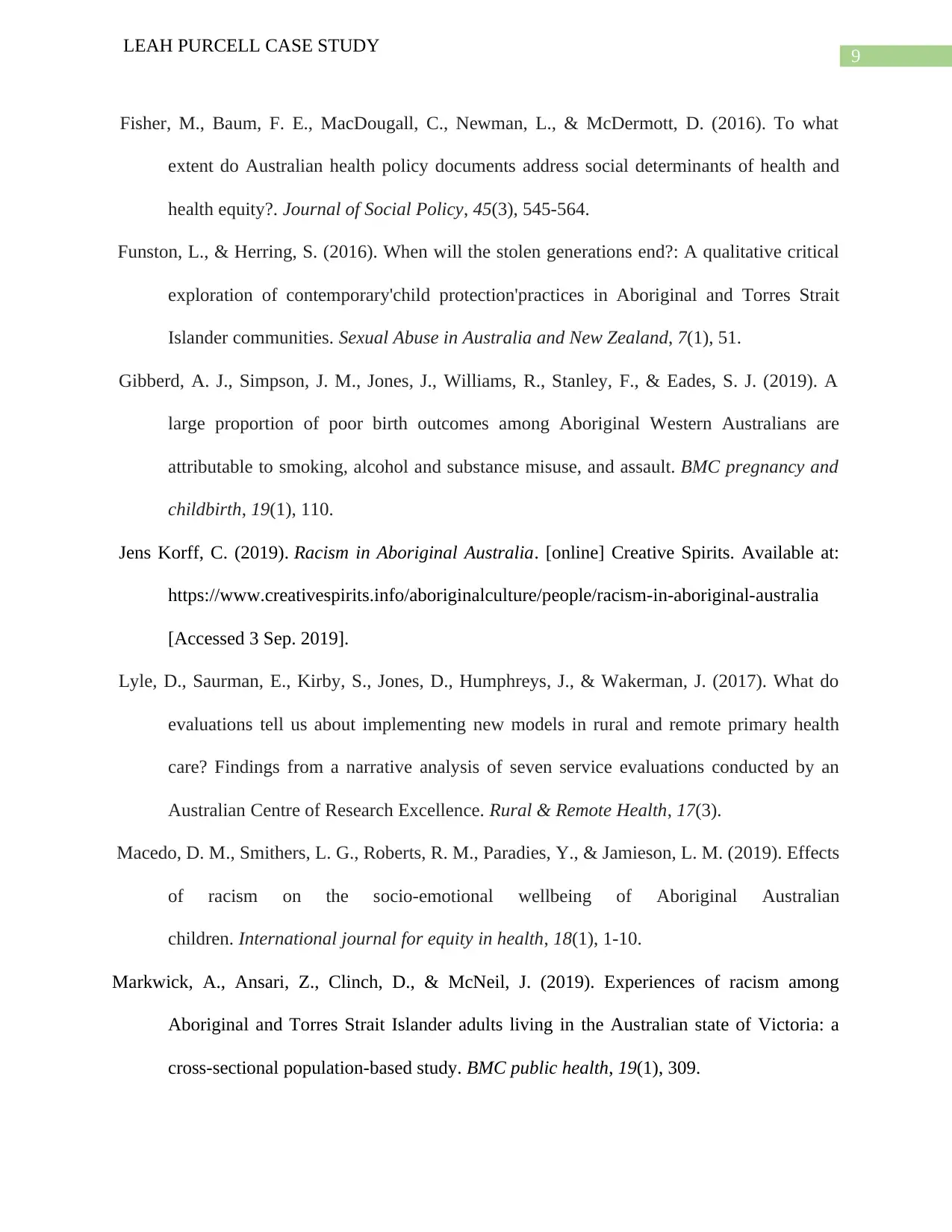
9
LEAH PURCELL CASE STUDY
Fisher, M., Baum, F. E., MacDougall, C., Newman, L., & McDermott, D. (2016). To what
extent do Australian health policy documents address social determinants of health and
health equity?. Journal of Social Policy, 45(3), 545-564.
Funston, L., & Herring, S. (2016). When will the stolen generations end?: A qualitative critical
exploration of contemporary'child protection'practices in Aboriginal and Torres Strait
Islander communities. Sexual Abuse in Australia and New Zealand, 7(1), 51.
Gibberd, A. J., Simpson, J. M., Jones, J., Williams, R., Stanley, F., & Eades, S. J. (2019). A
large proportion of poor birth outcomes among Aboriginal Western Australians are
attributable to smoking, alcohol and substance misuse, and assault. BMC pregnancy and
childbirth, 19(1), 110.
Jens Korff, C. (2019). Racism in Aboriginal Australia. [online] Creative Spirits. Available at:
https://www.creativespirits.info/aboriginalculture/people/racism-in-aboriginal-australia
[Accessed 3 Sep. 2019].
Lyle, D., Saurman, E., Kirby, S., Jones, D., Humphreys, J., & Wakerman, J. (2017). What do
evaluations tell us about implementing new models in rural and remote primary health
care? Findings from a narrative analysis of seven service evaluations conducted by an
Australian Centre of Research Excellence. Rural & Remote Health, 17(3).
Macedo, D. M., Smithers, L. G., Roberts, R. M., Paradies, Y., & Jamieson, L. M. (2019). Effects
of racism on the socio-emotional wellbeing of Aboriginal Australian
children. International journal for equity in health, 18(1), 1-10.
Markwick, A., Ansari, Z., Clinch, D., & McNeil, J. (2019). Experiences of racism among
Aboriginal and Torres Strait Islander adults living in the Australian state of Victoria: a
cross-sectional population-based study. BMC public health, 19(1), 309.
LEAH PURCELL CASE STUDY
Fisher, M., Baum, F. E., MacDougall, C., Newman, L., & McDermott, D. (2016). To what
extent do Australian health policy documents address social determinants of health and
health equity?. Journal of Social Policy, 45(3), 545-564.
Funston, L., & Herring, S. (2016). When will the stolen generations end?: A qualitative critical
exploration of contemporary'child protection'practices in Aboriginal and Torres Strait
Islander communities. Sexual Abuse in Australia and New Zealand, 7(1), 51.
Gibberd, A. J., Simpson, J. M., Jones, J., Williams, R., Stanley, F., & Eades, S. J. (2019). A
large proportion of poor birth outcomes among Aboriginal Western Australians are
attributable to smoking, alcohol and substance misuse, and assault. BMC pregnancy and
childbirth, 19(1), 110.
Jens Korff, C. (2019). Racism in Aboriginal Australia. [online] Creative Spirits. Available at:
https://www.creativespirits.info/aboriginalculture/people/racism-in-aboriginal-australia
[Accessed 3 Sep. 2019].
Lyle, D., Saurman, E., Kirby, S., Jones, D., Humphreys, J., & Wakerman, J. (2017). What do
evaluations tell us about implementing new models in rural and remote primary health
care? Findings from a narrative analysis of seven service evaluations conducted by an
Australian Centre of Research Excellence. Rural & Remote Health, 17(3).
Macedo, D. M., Smithers, L. G., Roberts, R. M., Paradies, Y., & Jamieson, L. M. (2019). Effects
of racism on the socio-emotional wellbeing of Aboriginal Australian
children. International journal for equity in health, 18(1), 1-10.
Markwick, A., Ansari, Z., Clinch, D., & McNeil, J. (2019). Experiences of racism among
Aboriginal and Torres Strait Islander adults living in the Australian state of Victoria: a
cross-sectional population-based study. BMC public health, 19(1), 309.
Paraphrase This Document
Need a fresh take? Get an instant paraphrase of this document with our AI Paraphraser
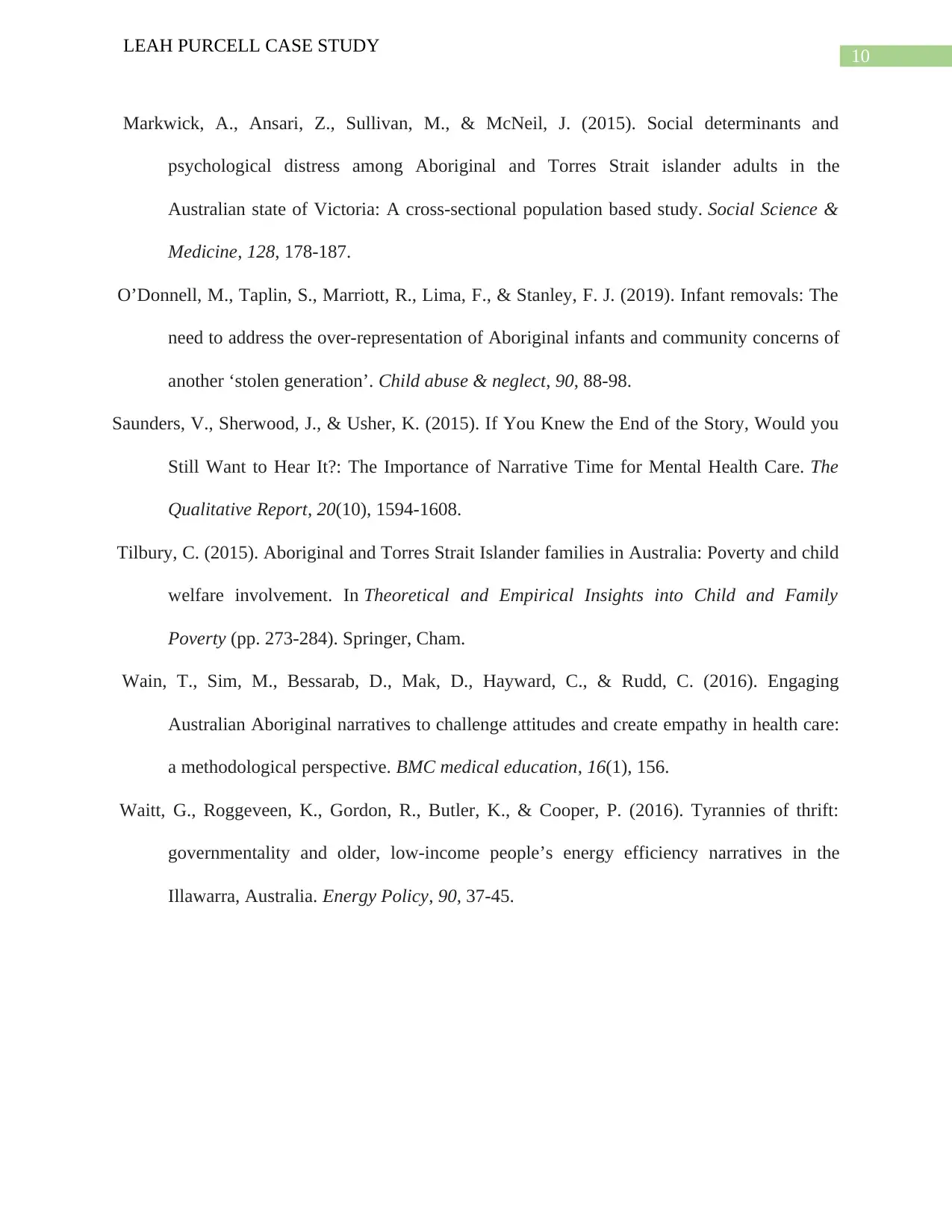
10
LEAH PURCELL CASE STUDY
Markwick, A., Ansari, Z., Sullivan, M., & McNeil, J. (2015). Social determinants and
psychological distress among Aboriginal and Torres Strait islander adults in the
Australian state of Victoria: A cross-sectional population based study. Social Science &
Medicine, 128, 178-187.
O’Donnell, M., Taplin, S., Marriott, R., Lima, F., & Stanley, F. J. (2019). Infant removals: The
need to address the over-representation of Aboriginal infants and community concerns of
another ‘stolen generation’. Child abuse & neglect, 90, 88-98.
Saunders, V., Sherwood, J., & Usher, K. (2015). If You Knew the End of the Story, Would you
Still Want to Hear It?: The Importance of Narrative Time for Mental Health Care. The
Qualitative Report, 20(10), 1594-1608.
Tilbury, C. (2015). Aboriginal and Torres Strait Islander families in Australia: Poverty and child
welfare involvement. In Theoretical and Empirical Insights into Child and Family
Poverty (pp. 273-284). Springer, Cham.
Wain, T., Sim, M., Bessarab, D., Mak, D., Hayward, C., & Rudd, C. (2016). Engaging
Australian Aboriginal narratives to challenge attitudes and create empathy in health care:
a methodological perspective. BMC medical education, 16(1), 156.
Waitt, G., Roggeveen, K., Gordon, R., Butler, K., & Cooper, P. (2016). Tyrannies of thrift:
governmentality and older, low-income people’s energy efficiency narratives in the
Illawarra, Australia. Energy Policy, 90, 37-45.
LEAH PURCELL CASE STUDY
Markwick, A., Ansari, Z., Sullivan, M., & McNeil, J. (2015). Social determinants and
psychological distress among Aboriginal and Torres Strait islander adults in the
Australian state of Victoria: A cross-sectional population based study. Social Science &
Medicine, 128, 178-187.
O’Donnell, M., Taplin, S., Marriott, R., Lima, F., & Stanley, F. J. (2019). Infant removals: The
need to address the over-representation of Aboriginal infants and community concerns of
another ‘stolen generation’. Child abuse & neglect, 90, 88-98.
Saunders, V., Sherwood, J., & Usher, K. (2015). If You Knew the End of the Story, Would you
Still Want to Hear It?: The Importance of Narrative Time for Mental Health Care. The
Qualitative Report, 20(10), 1594-1608.
Tilbury, C. (2015). Aboriginal and Torres Strait Islander families in Australia: Poverty and child
welfare involvement. In Theoretical and Empirical Insights into Child and Family
Poverty (pp. 273-284). Springer, Cham.
Wain, T., Sim, M., Bessarab, D., Mak, D., Hayward, C., & Rudd, C. (2016). Engaging
Australian Aboriginal narratives to challenge attitudes and create empathy in health care:
a methodological perspective. BMC medical education, 16(1), 156.
Waitt, G., Roggeveen, K., Gordon, R., Butler, K., & Cooper, P. (2016). Tyrannies of thrift:
governmentality and older, low-income people’s energy efficiency narratives in the
Illawarra, Australia. Energy Policy, 90, 37-45.
1 out of 11
Related Documents
Your All-in-One AI-Powered Toolkit for Academic Success.
+13062052269
info@desklib.com
Available 24*7 on WhatsApp / Email
![[object Object]](/_next/static/media/star-bottom.7253800d.svg)
Unlock your academic potential
Copyright © 2020–2026 A2Z Services. All Rights Reserved. Developed and managed by ZUCOL.





